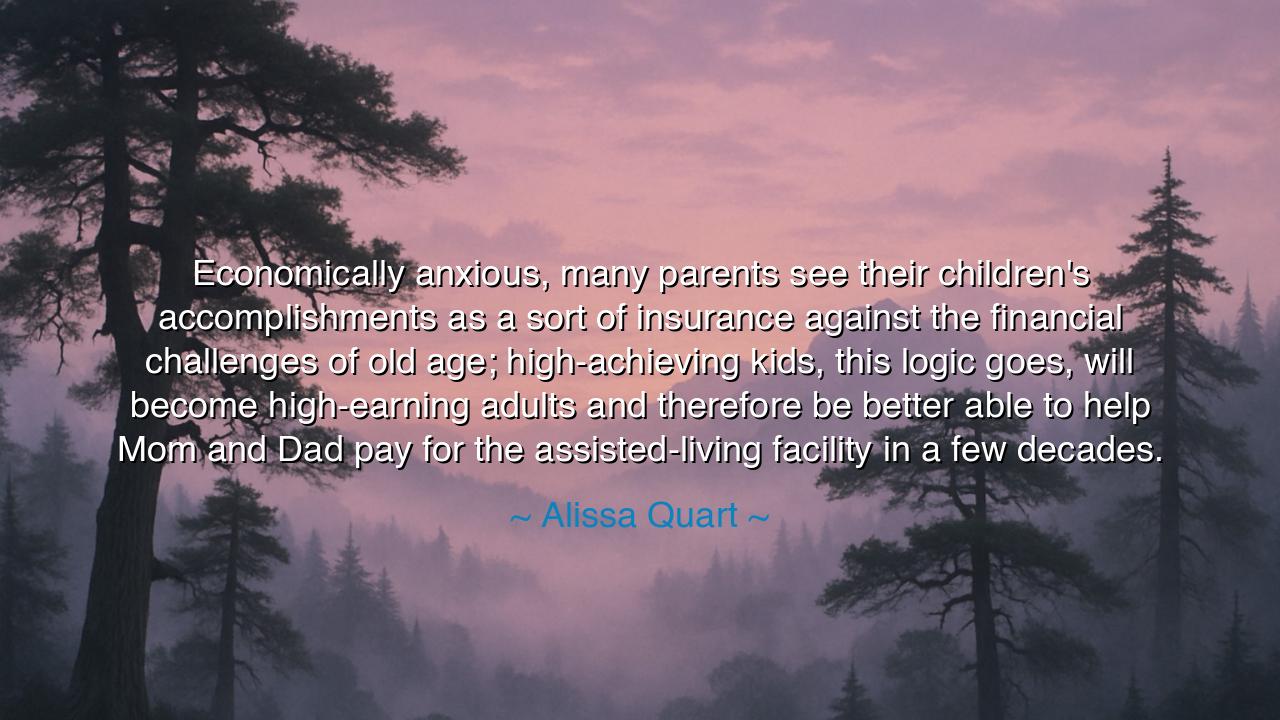
Economically anxious, many parents see their children's
Economically anxious, many parents see their children's accomplishments as a sort of insurance against the financial challenges of old age; high-achieving kids, this logic goes, will become high-earning adults and therefore be better able to help Mom and Dad pay for the assisted-living facility in a few decades.






In the words of Alissa Quart, “Economically anxious, many parents see their children's accomplishments as a sort of insurance against the financial challenges of old age; high-achieving kids, this logic goes, will become high-earning adults and therefore be better able to help Mom and Dad pay for the assisted-living facility in a few decades.” Within these words lies a profound reflection on the modern condition — a lament of how love, once the purest and most selfless of human emotions, has become entangled with the fears and burdens of a market-driven age. Quart, with the insight of a philosopher and the empathy of a storyteller, reveals how the tender bond between parent and child is being reshaped by the quiet tyranny of economic anxiety.
In older times, a parent’s pride in a child’s accomplishments was a matter of virtue, not of survival. The father rejoiced not because the son would one day provide wealth, but because he would carry forward honor. The mother took joy not because the daughter might secure stability, but because she would embody wisdom and kindness. Yet now, in the age of uncertainty — an age ruled by debt, scarcity, and the cost of care — even love has become shadowed by fear of the future. Parents, who once labored for their children’s joy, now labor for their children’s success, believing it a shield against the growing storms of old age.
This is the tragedy and irony of modern civilization: that progress, while delivering abundance, has also birthed insecurity. Families are bound by affection but pressured by systems that measure worth in earnings and grades. The home becomes not a sanctuary of love, but a workshop of ambition. The child grows beneath the weight of expectation, and the parent’s dreams become mingled with their anxieties — so that what should be a bond of nurturing becomes a quiet exchange of mutual dependence. In this, Quart captures the paradox of our age: that even in prosperity, the human spirit trembles with fear of loss.
History reminds us that such transformations of the heart often mark a deeper spiritual struggle. In the declining days of ancient Rome, when wealth was abundant but faith was hollow, families too began to view children as extensions of fortune. Sons were taught not the virtues of citizenship, but the tactics of advancement; daughters were wed not for love, but for alliances. The empire that once stood upon shared duty began to crumble under the weight of self-preservation. And so, the lesson repeats: when love becomes transactional, when generations cease to serve each other freely, the spirit of the people begins to decay, even as their towers rise higher.
But Quart’s words are not mere condemnation; they are a mirror, urging us to look deeply into our motives and fears. She reminds us that this economic anxiety is not born of greed, but of vulnerability — of parents who see the world growing harsher and cling to their children’s potential as their last defense. There is tenderness, even in the desperation. Yet she also warns us that when we teach our children that their worth is measured in productivity, we rob them of something greater — the joy of curiosity, the freedom to fail, the sacred right to live without constant fear of falling short.
The lesson is this: while the world may press upon us with its demands for wealth and security, we must not allow these forces to consume the nobility of love. Parents must remember that their truest legacy is not a return on investment, but the cultivation of character, compassion, and courage in their children. And children, in turn, must honor their parents not with money, but with understanding — recognizing that behind their ambitions lies the old, trembling desire of every human heart: the longing to be safe, to be remembered, and to be loved.
So, children of this uncertain age, take heed: do not let the marketplace define the value of your relationships. Work, yes, but work with purpose; succeed, but not at the cost of your soul. And parents, raise your children not as your insurance, but as your inheritance — not to protect you from the future, but to carry your spirit forward into it. For wealth fades, and accolades are forgotten, but love freely given endures across all generations.
Thus spoke Alissa Quart, and through her insight we glimpse the ancient truth reborn: that in every age, the greatest riches are not stored in banks, but in hearts that have not been bought by fear. Let us then live, love, and raise one another with courage — not as traders in affection, but as keepers of a sacred trust that outlasts both fortune and time.






AAdministratorAdministrator
Welcome, honored guests. Please leave a comment, we will respond soon